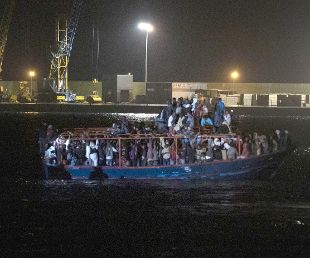The Extraordinary Reception of Unaccompanied Minors: The Ragusa Prefecture Looks to Open New Centres
At the end of July, the Chamber of Deputies approved the legislation of a new decree related to urgent financial measures, proposing “extraordinary measures for the reception of unaccompanied foreign minors”. These emergency measures have a a decidedly unconstitutional aspect, as ASGI* has also observed in an open letter, and which practically gives a free reign for the creation of new Extraordinary Reception Centres (CAS*) for unaccompanied minors.
The proposal is, in situations defined no better than those facing difficulties in the management of arrivals in close succession, to create temporary reception structures for unaccompanied foreign minors with a capacity of up to 50 places, and aimed only at identification, information and the accertation of age. This is a line which has been heard already too many times, so as to cover over the reasonable suspicion that such structures will soon be transformed into CAS* for minors, with all that entails. We will have, therefore, centres for far greater numbers of people, lacking adequate protection for the vulnerable, the annulment of services for social integration and inclusion, even for minors. The situations of abandonment and illegitimacy will only increase when, as soon as they become adults, appropriate places will not be found for the minors within the foreseen two months, and instead they will risk being moved into a CAS* for the entirety of their stay in Italy.
This is simply the latest emergency response which confirms the lack of will to realistically modify the reception system, and the choice instead to continue to act without respect for national or international law, to the detriment of under-age migrants. The Prefecture of Ragusa has already begun to adopt measures for the extraordinary reception of minors, in a moment of delicate transition between managing bodies of various centres and the opening of new structures for migrants, following a new tendering process. From August 1st, the management of the Pozzallo Hotspot passed over to the ‘Domus Caritatis’ coop in Rome, which is linked to the much better known ‘La Cascina’ coop, involved in the Mafia Capitale scandal; a calling card which simply confirms how, in our country, those who are under investigation are nonetheless awarded and handed important responsibilities. The management of the phenomenon of migration is being increasingly tied up with business and corruption, rather than with respect for a humanitarian politics and human rights.
Meanwhile, hundreds upon hundreds of migrants continue to be taken to the Hotspot following the recent landings; people who in more than one case have seen their travelling companions die in the long journey. Men, women, children and unaccompanied minors who now seem to be transferred within short enough time period. This would be good news, if it were not for the illegitimate practice of transferring people yet another “emergency” situation outside of the law: dozens of young men have been taken from the Hotspot to structures throughout the province, according to a method which is still fairly unclear but nevertheless is a consequence of the extraordinary measures thought up for the minors. It seems in fact the managers of some centres for adults in the province of Ragusa have made themselves available to the Prefecture for the reception of some of the numerous unaccompanied minors who are otherwise destined to remain in the Hotspot. With a method of custody which is again quite unclear, these young men and women now find themselves, therefore, in centres which were originally active for, or consequently activated as, centres for the reception of adults.
A lack of competent staff, the necessity for an immediate reorganisation of the structure, the risk of abandoning new arrivals who, in some cases, have already runaway: in a situation like this, where the lack of protection is clear and preventable, it is shocking how professionals working in the reception sector have not made the protection of migrants the main objective, but yet again have instead probably prioritised an economic and political return. As a migrant who survived one of the recent shipwrecks said to us a few days ago: “Here again people only help you if you have something to exchange. When they rescued me from the sea, it was my information for the investigations; at the centre my presence for money, my story for newspapers and publicity. I asked if I could call my family, and then I became invisible once more.”
Soon, various emergency structures for minors will open in the province of Ragusa, one of them in Pozzallo. The proposal for a redistribution of minors throughout the country and the possibility to entrust them to city councils other than those where they arrive, for the safeguarding of their own interests, therefore risks being shot down by the new profits – and the new destructive practices – brought in by these new centres. This is, of course, to the detriment of whoever will have to stay there, and will be even further challenged to envision a decent future in a country which ignores their rights, even those who are only a little older than a child.
Lucia Borghi
Borderline Sicily
Project “OpenEurope” – Oxfam Italia, Diaconia Valdese, Borderline Sicilia Onlus
* ASGI – Association for Juridical Studies on Immigration
* CAS – Centri di Accoglienza Straordinaria (Extraordinary Reception Centres)
Translation: Richard Braude

